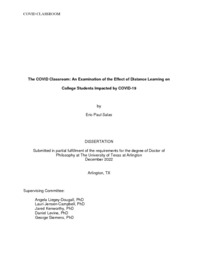| dc.description.abstract | As a result of the tumultuous events in 2020 related to the COVID-19 pandemic, the academic world was forced to adapt and relocate for the safety of students, faculty, and staff. These changes had a lasting impact on those directly involved and predicted many aspects of daily life. The purpose of this study was to examine the impact of life disruptions caused by distance learning, COVID-19 impact, and connectedness on the mental health and academic achievement of college-level students. Furthermore, to investigate the significance of resilience, self-compassion, and self-efficacy as predictive factors to stress, anxiety, and overall academic achievement. Additionally, this study examined themes across three domains (Impact of COVID-19, Positive, and Negative outcomes of remote learning) to better understand students’ perspectives of life during the pandemic. The study found that life disturbances (distance learning, COVID-19 impact, and connectedness) significantly predicted mental health and academic outcomes. The impact of COVID-19 positively predicted perceived stress. Additionally, connectedness negatively predicted perceived stress and positively predicted student engagement. Similarly, psychosocial factors (resilience, self-compassion, and self-efficacy) had direct effects on the impact of COVID-19 on mental health and academic outcomes. Overall, resilience negatively predicted anxiety and perceived stress. Similarly self-compassion negatively predicted anxiety and perceived stress, but positively predicted student engagement. Lastly, self-efficacy positively predicted student engagement. However, none of these factors significantly predicted GPA. Interestingly, a significant interaction indicated that more COVID-19 impact predicted more student engagement at the lowest level of self-compassion. Conversely, at the highest level of self-compassion, more COVID-19 impact predicted less student engagement. Overall, connectedness, resilience, and self-compassion were crucial factors on engagement and the management of students’ overall mental health. In general, these findings reaffirmed the significance of psychosocial factors on the wellbeing of college students during one of the most turbulent times in recent history. | |


